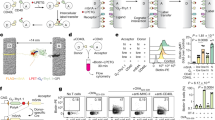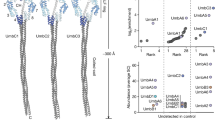Abstract
LYMPHOCYTES are activated to grow and divide when mitogens such as plant lectins bind to surface receptors. Several hypotheses have been advanced to explain how a signal which results from the interaction of an activating ligand with its receptors, may be transduced across the membrane to initiate cell activation1. Recently Edelman and co-workers proposed a model in which a complex, composed of receptor, microfilaments and microtubules serves as a regulator for lymphocyte mitogenesis2–6. From experiments in which colchicine, when added to stimulated cultures at various time intervals, gradually lost its capacity to suppress subsequent DNA synthesis over 30–40 h, it was concluded that drugs which disrupt microtubules block lymphocyte activation at the point at which a lymphocyte becomes committed to undergoing growth and division5,6. However, other similar experiments7,8 showed that colchicine was effective in suppressing DNA synthesis up to 48 h after the addition of mitogen. If indeed the microtubules are involved in the initiation of lymphocyte activation, then the disruption of these cytoplasmic structures should also affect cellular events which occur before DNA synthesis9.
This is a preview of subscription content, access via your institution
Access options
Subscribe to this journal
Receive 51 print issues and online access
$199.00 per year
only $3.90 per issue
Buy this article
- Purchase on Springer Link
- Instant access to full article PDF
Prices may be subject to local taxes which are calculated during checkout
Similar content being viewed by others
References
Resch, K., in Receptors and Recognition (edit. by Cuatrecasas, P., and Greaves, M. F.), 59–117 (Chapman and Hall, London, 1976).
Edelman, G. M., Science, 192, 218–226 (1976).
Edelman, G. M., Yahara, I., and Wang, J. L., Proc. natn. Acad. Sci. U.S.A., 70, 1442–1446 (1973).
Yahara, I., and Edelman, G. M., Expl Cell Res., 91, 125–142 (1975).
Wang, J. L., Gunther, G. R., and Edelman, G. M., J. Cell Biol., 66, 128–144 (1975).
Gunther, G. R., Wang, J. L., and Edelman, G. M., Expl Cell Res., 98, 15–22 (1976).
Medrano, E., Piras, R., and Mordoh, I., Expl Cell Res., 86, 295–300 (1974).
Betel, I., and Martijnse, J., Nature, 261, 318–319 (1976).
Ling, N. L., and Kay, J. E., Lymphocyte Stimulation (North-Holland, Amsterdam, 1975).
Resch, K., and Ferber, E. Eur. J. Biochem., 27, 153–161 (1972).
Resch, K., Gelfand, E. W., Hansen, K., and Ferber, E., Eur. J. Immun., 2, 598–601 (1972).
Resch, K., Ferber, E., Prester, M., and Gelfand, E. W., Eur. J. Immun., 6, 168–173 (1976).
Author information
Authors and Affiliations
Rights and permissions
About this article
Cite this article
RESCH, K., BOUILLON, D., GEMSA, D. et al. Drugs which disrupt microtubules do not inhibit the initiation of lymphocyte activation. Nature 265, 349–351 (1977). https://doi.org/10.1038/265349a0
Received:
Accepted:
Issue Date:
DOI: https://doi.org/10.1038/265349a0
This article is cited by
-
Influence of compounds affecting synthesis, modification and transport of proteins on the expression and release of interleukin‐2 receptor
Immunology & Cell Biology (1995)
-
Effect of colchicine derivatives on the antibody response inducedin vitro
Folia Microbiologica (1982)
-
Relationship between β-adrenergic receptors and adenylate cyclase in HeLa cells
Nature (1977)
-
Effect of microtubular antagonists on lymphocyte mitogenesis
Nature (1977)
Comments
By submitting a comment you agree to abide by our Terms and Community Guidelines. If you find something abusive or that does not comply with our terms or guidelines please flag it as inappropriate.



